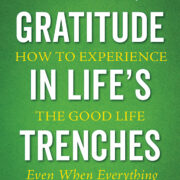Each of us has the power to bring meaning and purpose to our life by how we interpret the circumstances that confront us. The act of interpreting our experience in either positive or negative terms is called “framing.” The same set of circumstances that might be perceived by one person as depressing and discouraging set-backs (“the glass is half empty” mentality), might be perceived by another person as being challenging opportunities to grow through and overcome (“the glass is half full” mentality). In the former case, the person is framing their experience negatively; in the latter case the person is framing their experience positively. The difference between these two perspectives is not in the experiences themselves, but the narratives we tell ourselves about our experiences.
On that note positive note, let me give you some depressing news. Research shows that the human brain naturally defaults to narratives that frame our experiences in negative rather than positive terms. Research on negativity bias conducted by Alison Ledgerwood, a social psychologist at UC Davis, confirmed earlier insights that the human brain can convert positives into negatives almost half as easily as our brains can convert negatives into positives.
When Ledgerwood presented volunteers with scenarios in which data existed in a “gain frames” (i.e, “jobs saved”) and then presented other volunteers with the exact same data in a “loss frame” (i.e. “jobs lost”), she found that it significantly affected people’s judgment of the scenario, even though both groups were presented with the same data.
Similarly, when participants were asked to perform a simple math problem converting from gains to losses (when 600 lives are at stake, if 100 lives are saved, how many will be lost?), they could solve it in 7 seconds. By contrast, if the same problem was presented in a way that required participants to convert from losses to gains (when 600 lives are at stake, if 100 lives are lost, how many will be saved?), it took them eleven seconds. This confirmed that it is much easier for humans to frame experiences in terms that move from gains to losses than it is to frame the same experience in a way that moves from losses to gains.
The above insights are nothing new in the world of behavioral psychology. But the really ground-breaking part of Ledgerwood’s research was when she decided to ask how easily people can switch back and forth from one conceptualization to another, or whether we get stuck in one way of thinking about something. She found that loss frames are cognitively “stickier” than gain frames, that “it is more difficult for people to shift from conceptualizing an issue in terms of losses to reconceptualizing it in terms of gains (compared to shifting from gains to losses).” Once something had been put in a loss frame, the stickiness of that frame persists in the mind even after the information is switched to a gain frame.
This suggests that human beings are quite adept at reframing but only when the reframing is negative. By contrast, positive reframing is not natural to our minds, but takes hard work and deliberate choice. And it is even harder to frame experiences positively once we have allowed the negative frame to get stuck in our minds. As Ledgerwood put it when discussing her findings in the Journal of Experimental Psychology,
“once an issue is framed in terms of losses, this can have a lasting impact on judgment, even in the face of a current gain frame. ….the results suggest that it is cognitively easier for people to shift from conceptualizing information in terms of gains to reconceptualizing it in terms of losses than it is for them to reconstrue losses as gains. …whereas gain frames lead people to adopt gain-based conceptualizations that shift readily in response to reframing, loss frames lead to loss-based conceptualizations that stick in the face of reframing. The general picture emerging from these studies, then, is that loss frames tend to stick in the mind: Once applied, they may be difficult to change.”
Although negative frames are difficult to change, it is possible. In an earlier post I shared the amazing testimony of Nick Vujicic, a man born with no limbs, who moved from being a miserable, suicidal, self-pitying boy, to being a vibrant, joy-filled Christian evangelist. Nick explains in his videos that the way he made this transition was by learning to reframe his negative experiences in positive terms. So although this is hard to do, it isn’t impossible.
Getting back to Alison Ledgerwood’s research. I highly recommend you watch her Ted Talk video where she summarizes this research in very accessible terms, and explains how you can get unstuck from the negatives that dominate your life. To watch her video, click on the link below:
Alison Ledgerwood on Cognitive Reframing


